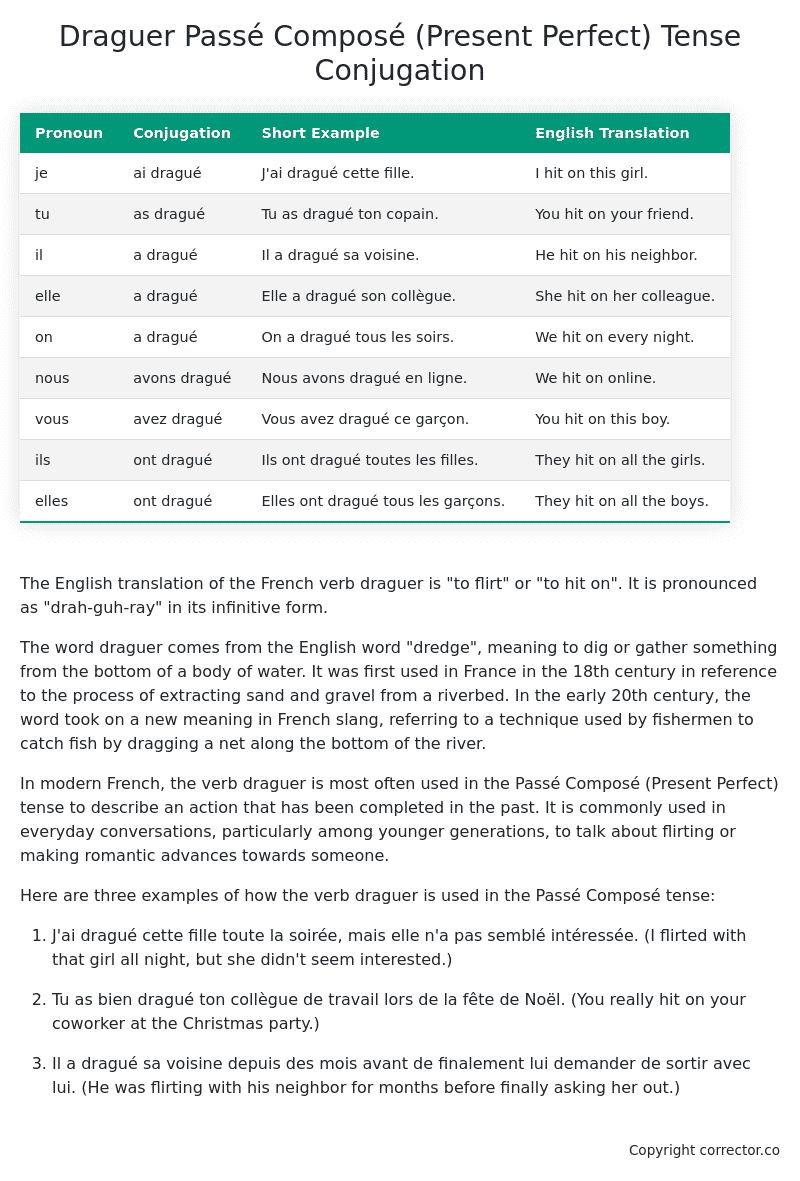Passé Composé (Present Perfect) Tense Conjugation of the French Verb draguer
Introduction to the verb draguer
The English translation of the French verb draguer is “to flirt” or “to hit on”. It is pronounced as “drah-guh-ray” in its infinitive form.
The word draguer comes from the English word “dredge”, meaning to dig or gather something from the bottom of a body of water. It was first used in France in the 18th century in reference to the process of extracting sand and gravel from a riverbed. In the early 20th century, the word took on a new meaning in French slang, referring to a technique used by fishermen to catch fish by dragging a net along the bottom of the river.
In modern French, the verb draguer is most often used in the Passé Composé (Present Perfect) tense to describe an action that has been completed in the past. It is commonly used in everyday conversations, particularly among younger generations, to talk about flirting or making romantic advances towards someone.
Here are three examples of how the verb draguer is used in the Passé Composé tense:
-
J’ai dragué cette fille toute la soirée, mais elle n’a pas semblé intéressée. (I flirted with that girl all night, but she didn’t seem interested.)
-
Tu as bien dragué ton collègue de travail lors de la fête de Noël. (You really hit on your coworker at the Christmas party.)
-
Il a dragué sa voisine depuis des mois avant de finalement lui demander de sortir avec lui. (He was flirting with his neighbor for months before finally asking her out.)
Table of the Passé Composé (Present Perfect) Tense Conjugation of draguer
| Pronoun | Conjugation | Short Example | English Translation |
|---|---|---|---|
| je | ai dragué | J’ai dragué cette fille. | I hit on this girl. |
| tu | as dragué | Tu as dragué ton copain. | You hit on your friend. |
| il | a dragué | Il a dragué sa voisine. | He hit on his neighbor. |
| elle | a dragué | Elle a dragué son collègue. | She hit on her colleague. |
| on | a dragué | On a dragué tous les soirs. | We hit on every night. |
| nous | avons dragué | Nous avons dragué en ligne. | We hit on online. |
| vous | avez dragué | Vous avez dragué ce garçon. | You hit on this boy. |
| ils | ont dragué | Ils ont dragué toutes les filles. | They hit on all the girls. |
| elles | ont dragué | Elles ont dragué tous les garçons. | They hit on all the boys. |
Other Conjugations for Draguer.
Le Present (Present Tense) Conjugation of the French Verb draguer
Imparfait (Imperfect) Tense Conjugation of the French Verb draguer
Passé Simple (Simple Past) Tense Conjugation of the French Verb draguer
Passé Composé (Present Perfect) Tense Conjugation of the French Verb draguer (this article)
Futur Simple (Simple Future) Tense Conjugation of the French Verb draguer
Futur Proche (Near Future) Tense Conjugation of the French Verb draguer
Plus-que-parfait (Pluperfect) Tense Conjugation of the French Verb draguer
Passé Antérieur (Past Anterior) Tense Conjugation of the French Verb draguer
Futur Antérieur (Future Anterior) Tense Conjugation of the French Verb draguer
Subjonctif Présent (Subjunctive Present) Tense Conjugation of the French Verb draguer
Subjonctif Passé (Subjunctive Past) Tense Conjugation of the French Verb draguer
Subjonctif Imparfait (Subjunctive Imperfect) Tense Conjugation of the French Verb draguer
Subjonctif Plus-que-parfait (Subjunctive Pluperfect) Tense Conjugation of the French Verb draguer
Conditionnel Présent (Conditional Present) Tense Conjugation of the French Verb draguer
Conditionnel Passé (Conditional Past) Tense Conjugation of the French Verb draguer
L’impératif Présent (Imperative Present) Tense Conjugation of the French Verb draguer
L’infinitif Présent (Infinitive Present) Tense Conjugation of the French Verb draguer
Struggling with French verbs or the language in general? Why not use our free French Grammar Checker – no registration required!
Get a FREE Download Study Sheet of this Conjugation 🔥
Simply right click the image below, click “save image” and get your free reference for the draguer present perfect tense conjugation!

Draguer – About the French Passé Composé (Present Perfect) Tense
Formation of the Passé Composé
Set the auxiliary verb with either
Conjugate the auxiliary verb
Add the past participle
Common everyday usage patterns
Narrating Past Events
Sequential Actions
Describing Completed Actions
Interactions with other tenses
Imperfect Tense
Conditional and Future Tenses
Summary
I hope you enjoyed this article on the verb draguer. Still in a learning mood? Check out another TOTALLY random French verb conjugation!


